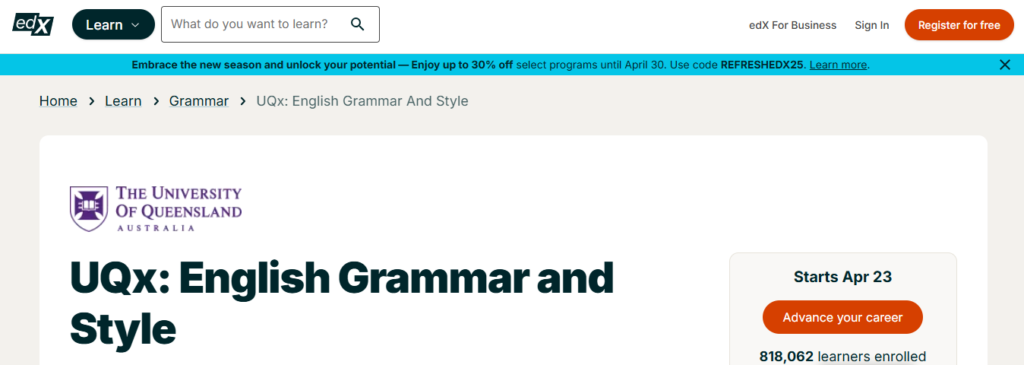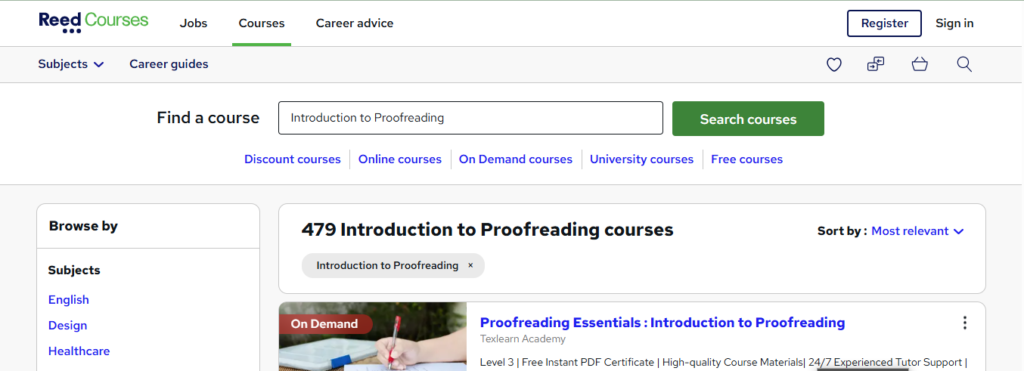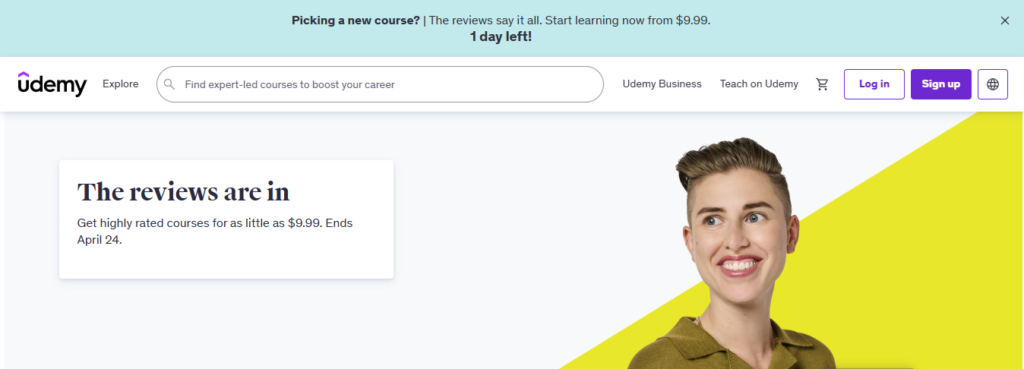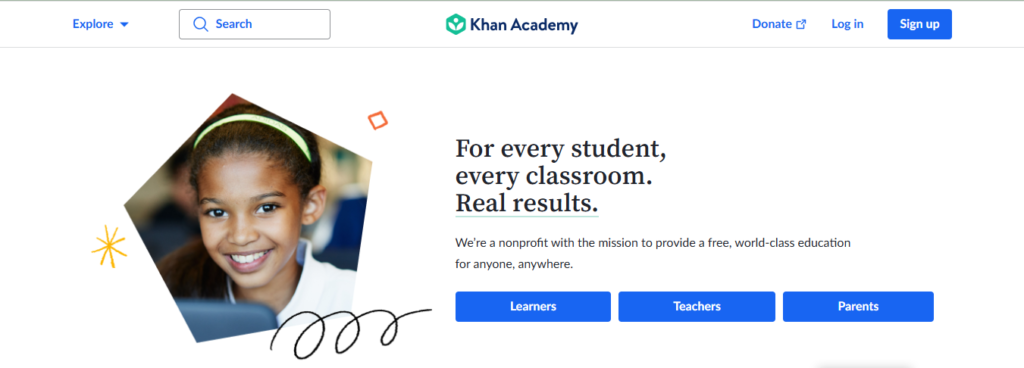Strong proofreading skills are more important than ever in today’s content-driven world. Whether you’re a student, writer, aspiring editor, or freelancer, the ability to spot grammar mistakes, punctuation errors, and awkward phrasing can make a huge difference in the quality of your writing and your career opportunities.
But learning to proofread doesn’t have to cost a fortune. Thanks to a growing number of online platforms, you can now access high-quality proofreading courses free of charge. These courses are perfect for beginners looking to develop a strong foundation or for experienced writers who want to sharpen their editing eye.
In this guide, we’ve handpicked 15 of the best free proofreading courses available online. Whether you want to improve your academic papers, prepare for freelance gigs, or simply write cleaner, clearer content, there’s a course here for you.
Why Learn Proofreading?
Proofreading is the final polish that transforms good writing into great writing. It involves checking for grammar mistakes, punctuation errors, spelling issues, formatting inconsistencies, and even subtle shifts in tone or meaning. Whether you’re crafting an essay, publishing a blog, or preparing a business report, strong proofreading skills ensure your message is clear, professional, and error-free.
Beyond personal projects, proofreading is a valuable skill in the professional world. Writers, bloggers, content marketers, students, and businesses all need clean, compelling text, and they often hire proofreaders to deliver it. With the rise of remote work and digital content, freelance proofreading has become a flexible, in-demand career path that you can start from home with minimal investment.
Learning proofreading also improves your overall communication. As you train your eye to catch errors, you’ll naturally become a better writer, editor, and reader. Whether you’re looking to freelance, improve your academic performance, or simply sharpen your language skills, proofreading is a practical and rewarding skill to have.
Top 15 Free Proofreading Courses
Below is a curated list of 15 top-rated proofreading courses that are completely free to access. Each course offers different strengths, whether you’re a total beginner, looking to refine your grammar, or exploring proofreading as a freelance career.
1. Proofreading and Copyediting 101 – Alison
Platform: Alison
Best For: Beginners

This course is perfect for those new to proofreading. Alison offers a structured introduction to the world of proofreading and copyediting, focusing on the key skills and techniques necessary for catching grammar errors, punctuation issues, and inconsistencies. The course also touches on freelance proofreading, making it an excellent choice for those looking to start their editing career. You’ll work through text-based lessons and video tutorials at your own pace. A certificate of completion is available for a small fee, but the course itself is free.
2. Grammar and Punctuation – Coursera (University of California, Irvine)
Platform: Coursera
Best For: Writers and ESL learners

This course offers a detailed breakdown of grammar and punctuation fundamentals, essential for effective proofreading. It’s perfect for writers or ESL learners who need to solidify their grammar understanding. The lessons cover everything from sentence structure to common mistakes in punctuation. It is structured as a 4-week course with video lessons and quizzes, helping learners test their progress. Although you can access the course for free, a certificate can be earned with payment after completion.
3. English Grammar and Style – edX (University of Queensland)
Platform: edX
Best For: Intermediate to advanced learners

This course takes a deeper dive into English grammar and style, making it ideal for those who already have a basic understanding of grammar but want to enhance their editing skills. You’ll learn advanced grammatical concepts, editing techniques, and how to improve the overall flow and structure of writing. The course is self-paced, with an 8-week duration. It is free to audit, with a certificate available for a fee.
4. Proofreading Tips and Techniques – Skillshare (Free Trial)
Platform: Skillshare
Best For: Aspiring freelancers
This course is designed to provide practical proofreading tips and techniques that you can apply immediately. It covers real-world examples and offers insights into the industry, making it particularly beneficial for those interested in freelancing. While Skillshare offers a free trial, you’ll need to subscribe for continued access. The course is relatively short, taking just over an hour, but it’s packed with valuable information for budding proofreaders.
5. Introduction to Proofreading – Reed.co.uk
Platform: Reed
Best For: Office and admin professionals

Reed offers a concise introduction to proofreading, focusing on the application of editing skills in professional settings such as business writing and office communication. The course covers key aspects of proofreading, from grammar and punctuation to layout and style. It’s a self-paced course, making it easy to fit into your schedule, and you’ll receive a certificate of completion at no extra cost.
6. Proofreading Practice Tool – Purdue OWL
Platform: Purdue Online Writing Lab
Best For: Students and academic writers

The Purdue OWL offers a practical proofreading tool, ideal for students and those in academia. This resource allows learners to practice their proofreading skills through interactive exercises, focusing on common grammatical errors and stylistic issues. While it doesn’t offer a certificate, it is a valuable hands-on tool for honing your proofreading abilities.
7. Editing and Proofreading Made Simple – Udemy (Free Version)
Platform: Udemy
Best For: Beginners and bloggers

This free course on Udemy provides an accessible introduction to editing and proofreading, highlighting the differences between the two processes and offering practical advice on catching common errors. With a focus on blog writing and personal projects, the course is brief but informative. It’s a great starting point for beginners and bloggers looking to improve their writing quality.
8. Free Proofreading Course for Beginners – Inklyo
Platform: Inklyo
Best For: Aspiring proofreaders and side hustlers
Inklyo’s free course for beginners offers a straightforward approach to proofreading, guiding learners through the basics of grammar, punctuation, and common errors. The course is delivered via email and is designed to help you get started quickly. Although there’s no certificate offered, this course is an easy and free way to begin your proofreading journey.
9. Writing and Editing: Revising – FutureLearn (Open University)
Platform: FutureLearn
Best For: Academic and nonfiction writers

This 2-week course from FutureLearn focuses on revising and editing academic writing, making it perfect for students and nonfiction writers. You’ll learn proofreading techniques specifically tailored to the revision process, improving both grammar and overall clarity. The course is interactive, and you can receive a certificate upon completion with an upgrade.
10. Practical Proofreading Exercises – Khan Academy (Grammar Section)
Platform: Khan Academy
Best For: Grammar basics and practice

Khan Academy offers practical exercises that help reinforce basic grammar rules—ideal for beginners looking to brush up on their skills. These interactive lessons allow you to practice proofreading by correcting common grammatical errors. The course is free, and although it doesn’t offer a certificate, it is a fantastic resource for foundational grammar practice.
11. Proofreaders’ Marks Training – YouTube (Various Channels)
Platform: YouTube
Best For: Visual learners
Various YouTube channels offer tutorials on proofreading marks, which are essential for any editor or proofreader. These visual lessons show you how to mark up documents, highlighting common errors such as missing punctuation or awkward phrasing. The courses range in length from 10 to 30 minutes and are highly practical. While no certificate is available, the hands-on learning is beneficial for anyone looking to master proofreading marks.
12. Introduction to Copyediting and Proofreading – The Publishing Training Centre (Free Sample)
Platform: Publishing Training Centre
Best For: Aspiring editors
The Publishing Training Centre offers a free sample of their introductory course, which provides a comprehensive overview of copyediting and proofreading in publishing. The sample covers essential proofreading skills, editing for clarity, and correcting common errors. Although you’ll need to upgrade for full course access, the free sample gives a solid introduction to the editing process.
13. The Elements of Style – Bartleby/Open Access
Platform: Open Access
Best For: Writers looking to improve style and grammar
This classic text by Strunk and White, available online for free, offers invaluable insights into the art of writing and proofreading. It covers fundamental rules of grammar, composition, and style, which are crucial for both writing and editing. Though it’s not a traditional course, it is a comprehensive guide to improving your proofreading and writing style.
14. Daily Grammar Lessons – DailyGrammar.com
Platform: DailyGrammar.com
Best For: Daily learners and grammar refreshers
Daily Grammar offers a series of email-based lessons that cover various grammar and proofreading topics. Each lesson is short and manageable, making it perfect for busy individuals who want to improve their proofreading skills day by day. It’s free and doesn’t provide a certificate, but it’s an excellent resource for daily grammar practice.
15. Introduction to Freelance Proofreading – Proofread Anywhere (Free Workshop)
Platform: Proofread Anywhere
Best For: Career-minded learners
Proofread Anywhere offers a free introductory workshop that gives you an inside look into the world of freelance proofreading. This course covers how to get started in the proofreading business, tips for finding clients, and the mindset needed for success. Although there is no certificate, this workshop is invaluable for anyone looking to turn proofreading into a career.
What to Look for in a Proofreading Course
When selecting a proofreading course, consider the following key factors to ensure you get the most value:
- Course Content and Structure: Ensure the course covers essential proofreading skills like grammar, punctuation, and style. Look for a structured curriculum that progresses logically.
- Practical Exercises: Choose a course with hands-on exercises to apply what you’ve learned, such as quizzes or practice documents.
- Instructor Credentials: Verify that the instructor has relevant experience and expertise. Check reviews for feedback on their teaching style and effectiveness.
- Flexibility: Look for self-paced courses that allow you to learn at your convenience. Ensure the course is accessible on multiple devices.
- Cost and Certification: If you’re looking for a certificate, check whether it’s offered. Free courses may lack certificates, but still provide valuable content.
- Support and Community: A good course should offer access to support through forums or Q&A sessions with instructors or peers.
- Post-Course Resources: Some courses provide additional materials or community access after completion, which can help you continue learning.
Tips to Maximize Learning from Free Courses
While free proofreading courses are an excellent resource, maximizing their value requires a proactive approach. Here are some tips to help you get the most out of these courses:
- Set Clear Goals: Before starting, define what you hope to achieve from the course whether it’s mastering grammar or preparing for a freelance career. This focus will keep you motivated.
- Create a Study Schedule: Treat the course like a paid class by setting aside regular time each week to complete lessons. Consistency will help reinforce learning.
- Take Notes: Writing down key points will help you retain important information and make it easier to review later.
- Practice Regularly: Apply what you learn through exercises or real-world proofreading tasks. The more you practice, the more skilled you’ll become.
- Engage with the Community: If the course has forums or discussion groups, participate actively. Engaging with other learners can offer valuable insights and clarify doubts.
- Seek Feedback: Whenever possible, get feedback on your work. This will help you identify areas for improvement and refine your skills.
- Review Course Materials: Don’t rush through the course. Revisit difficult sections and review materials multiple times to reinforce your knowledge.
- Utilize Additional Resources: Many free courses provide supplementary materials. Make sure to take advantage of these to deepen your understanding.
What’s Next After Completing a Free Course?
Finishing a free proofreading course is a great first step, but your journey doesn’t end there. Start by applying what you’ve learned through consistent practice, proofreading blog posts, essays, or even your writing to build confidence. Consider creating a portfolio of sample work, which is useful if you plan to offer freelance services. You can also explore advanced or paid courses to deepen your skills and earn certifications. Joining online communities or networking with other proofreaders can open doors to mentorship, job leads, and valuable feedback. The key is to stay engaged, keep practicing, and continue learning to refine your proofreading expertise.
FAQs
Are free proofreading courses effective?
Yes, many free courses offer quality instruction and practical exercises that can help you build strong proofreading skills.
Do free proofreading courses offer certificates?
Some do, but most free courses don’t include a certificate. However, they still provide valuable learning.
Can I get freelance work after completing a free course?
Absolutely. With consistent practice and a strong portfolio, many people start freelance proofreading after taking free courses.
How long do these courses usually take to complete?
It varies. Some can be completed in a few hours, while others may take a few weeks, depending on the depth of content.
Do I need prior experience to start a proofreading course?
No prior experience is needed. Most free courses are beginner-friendly and start with the basics.
What tools should I use alongside these courses?
Tools like Grammarly, Hemingway Editor, and Google Docs can help reinforce your proofreading skills during and after the course.
Hi there. My name is Abbas Khan. I’m passionate about finding smart ways to save and make money from anywhere in the world.
Learning how to earn remotely and manage my finances gave me true freedom, and now I want to help you do the same.
Join me as I explore money-saving hacks, income ideas, and tips to build a flexible, location-independent lifestyle you’ll love.


1 thought on “Top 15 Free Proofreading Courses”